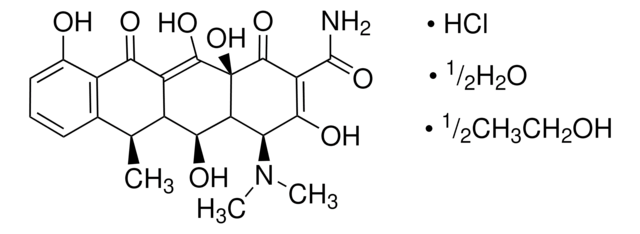197333
ABT-737
≥97% (HPLC), solid, Bcl-2 inhibitor, Calbiochem®
Synonyme(s) :
Bcl-2 Inhibitor VI, ABT-737, 4-{4-[(4ʹ-Chlorobiphenyl-2-yl)methyl]piperazin-1-yl}-N-{[4-({(1R)-3-(dimethylamino)-1-[(phenylsulfanyl)methyl]propyl}amino)-3-nitrophenyl]sulfonyl}benzamide
About This Item
Produits recommandés
product name
Bcl-2 Inhibitor VI, ABT-737, The Bcl-2 Inhibitor VI, ABT-737, also referenced under CAS 852808-04-9, controls the biological activity of Bcl-2. This small molecule/inhibitor is primarily used for Activators/Inducers applications.
Niveau de qualité
Pureté
≥97% (HPLC)
Forme
solid
Fabricant/nom de marque
Calbiochem®
Conditions de stockage
OK to freeze
protect from light
Couleur
yellow
Solubilité
DMSO: 50 mg/mL
Conditions d'expédition
ambient
Température de stockage
2-8°C
InChI
1S/C42H45ClN6O5S2/c1-46(2)23-22-35(30-55-37-9-4-3-5-10-37)44-40-21-20-38(28-41(40)49(51)52)56(53,54)45-42(50)32-14-18-36(19-15-32)48-26-24-47(25-27-48)29-33-8-6-7-11-39(33)31-12-16-34(43)17-13-31/h3-21,28,35,44H,22-27,29-30H2,1-2H3,(H,45,50)/t35-/m1/s1
Clé InChI
HPLNQCPCUACXLM-PGUFJCEWSA-N
Description générale
Conditionnement
Avertissement
Reconstitution
Autres remarques
Oltersdorf, T., et al. 2005. Nature435, 677.
Informations légales
Code de la classe de stockage
11 - Combustible Solids
Classe de danger pour l'eau (WGK)
WGK 3
Point d'éclair (°F)
Not applicable
Point d'éclair (°C)
Not applicable
Certificats d'analyse (COA)
Recherchez un Certificats d'analyse (COA) en saisissant le numéro de lot du produit. Les numéros de lot figurent sur l'étiquette du produit après les mots "Lot" ou "Batch".
Déjà en possession de ce produit ?
Retrouvez la documentation relative aux produits que vous avez récemment achetés dans la Bibliothèque de documents.
Les clients ont également consulté
Notre équipe de scientifiques dispose d'une expérience dans tous les secteurs de la recherche, notamment en sciences de la vie, science des matériaux, synthèse chimique, chromatographie, analyse et dans de nombreux autres domaines..
Contacter notre Service technique
